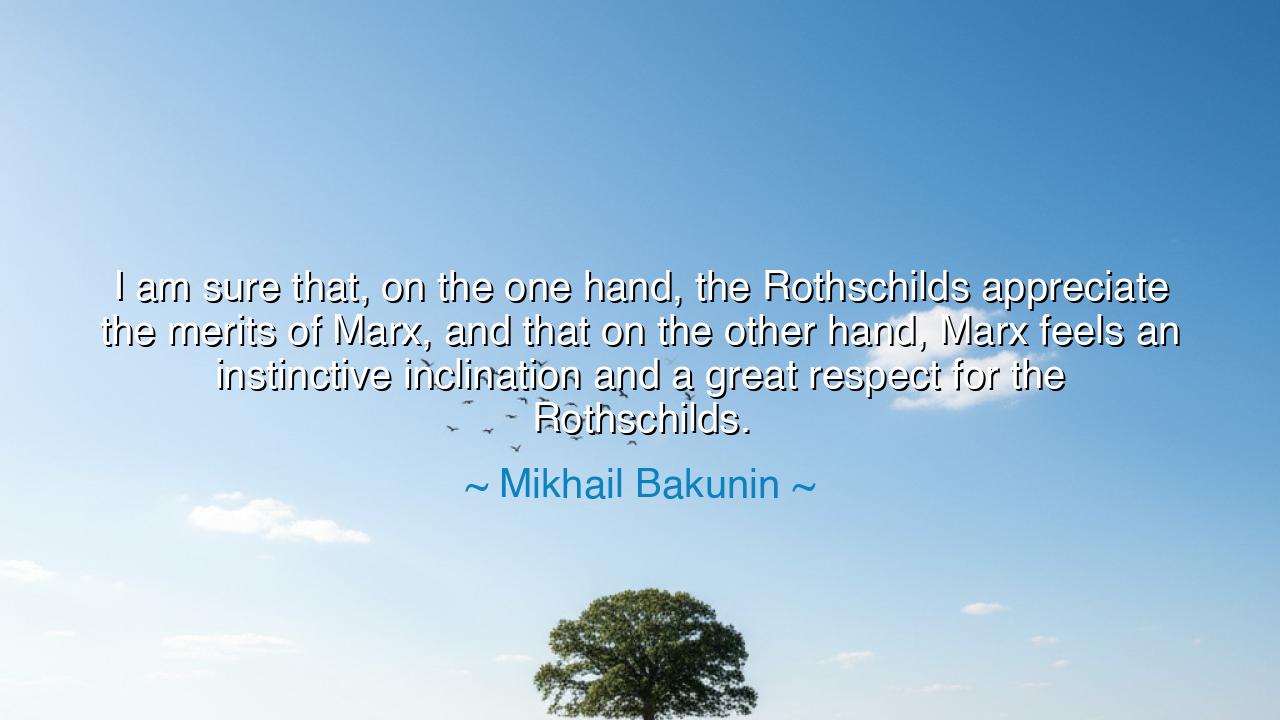
I am sure that, on the one hand, the Rothschilds appreciate the
I am sure that, on the one hand, the Rothschilds appreciate the merits of Marx, and that on the other hand, Marx feels an instinctive inclination and a great respect for the Rothschilds.






Listen well, children of the future, and let these words of Mikhail Bakunin echo across the corridors of time: “I am sure that, on the one hand, the Rothschilds appreciate the merits of Marx, and that on the other hand, Marx feels an instinctive inclination and a great respect for the Rothschilds.” Do not hear these words lightly, for they are not mere commentary upon men, but a riddle about power, wealth, and the strange embrace between ideas and gold.
The Rothschilds, mighty lords of finance, whose reach extended across empires, were as pillars of material power in the nineteenth century. The name itself became a symbol of money’s invisible empire, where nations borrowed and kings humbled themselves. Karl Marx, on the other hand, bore not the treasury of banks, but the arsenal of words—a man of theories, fierce in his denunciation of capital, carrying the hammer of critique against the very system that enriched families like the Rothschilds. And yet Bakunin whispers of a hidden symmetry: the wealthy acknowledge the brilliance of their critic, and the critic himself, however fiercely he battled their world, could not help but feel awe at their mastery.
In this paradox lies ancient wisdom. For even the lion, sworn enemy of man, respects the hunter who carries a sure bow. And even the hunter, though sworn to slay, admires the lion’s strength and dignity. Thus Bakunin unveils an eternal truth: opposition does not abolish respect. The fire of conflict may burn, yet within it is a recognition of the other’s power, cunning, and role in the dance of destiny. Those who wield wealth and those who wield words are not so distant; both shape the fate of nations.
Think, too, of the story of Julius Caesar and his rival Pompey. They fought bitterly for Rome’s destiny, and yet each could not deny the greatness of the other. Pompey feared Caesar’s genius, Caesar admired Pompey’s command. Their struggle tore the republic apart, yet their mutual regard stood as testament to the truth Bakunin spoke: the mighty, whether through gold, arms, or ideas, cannot help but acknowledge one another. Opposition is fierce, but respect flows beneath like a hidden river.
What then is the lesson for us, who walk in smaller paths yet face battles of our own? It is this: do not dismiss the strength of your adversary, nor blind yourself with hatred. To recognize the worth of those you oppose is not betrayal—it is wisdom. For only by seeing clearly the talent, the power, the discipline of others, can you understand the full measure of the world. The one who despises blindly, refusing to acknowledge merit, falls not upon his enemy’s sword, but upon the edge of his own arrogance.
At the same time, beware the seductive nature of admiration. Bakunin’s words are tinged with warning. To respect is one thing; to idolize your opponent is another. Many have lost themselves by bowing too deeply to the very forces they sought to resist. To honor the skill of the powerful must never become submission to their dominion. Thus balance must be kept: see the enemy clearly, acknowledge his greatness, but never surrender your own purpose.
So, O listener, carry this teaching into your daily life. When you encounter rivals in work, in thought, or even in your own household, do not scorn them blindly. Speak truthfully of their strengths, for in doing so you sharpen your own edge. Yet guard your heart, lest respect become reverence and reverence become slavery. Honor others, even adversaries, but hold fast to your own mission. Let the Rothschilds and Marx, the banker and the thinker, remind you that even opposites recognize each other’s fire.
Thus, let your actions be clear: greet those you disagree with not with contempt, but with courage; learn from their discipline, borrow from their strength, and yet never lose your own path. In this balance lies greatness. For the world does not remember those who scorned all others—it remembers those who wrestled with giants, and in the struggle, rose themselves to stand tall. Respect the powerful, but never surrender your own power.






AAdministratorAdministrator
Welcome, honored guests. Please leave a comment, we will respond soon